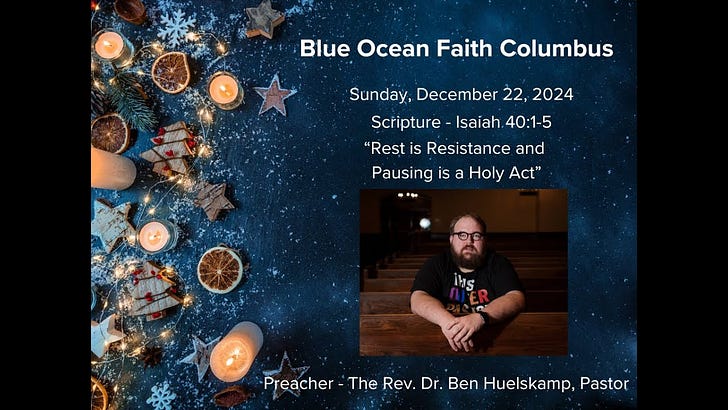(This message was pre-recorded and sent to Blue Ocean Columbus congregants via email on Sunday, December 22, 2024.)
Friends, even though we are gathering for Christmas Eve-Eve-Eve today, I wanted to offer you a scripture, message, and prayer today. Our scripture today speaks directly to a people in exile, a community broken by the weight of injustice, suffering, and displacement. There are clear parallels between Isaiah’s audience and us today. We are living in a very uncertain and precarious time. We are encouraged and compelled to do more work, to create shields against the suffering that has already crossed the horizon, and to build environments of resistance. Yet, our scripture begins with a tender command: “Comfort, O comfort my people.”
Isaiah’s message is radical. It calls people to hope in the midst of exhaustion. It’s a call to pause and take a breath, to hear the promise that God’s glory is on its way, and to trust that transformation is coming. But here’s the key: this hope is not something passive. It doesn’t mean giving up the work of justice but rather finding strength, rest, and renewal within the rhythm of pausing and trusting in God’s presence.
For those of us engaged in the work of justice, this passage offers an important message. Often, we find ourselves constantly pushing forward, striving to dismantle systems of oppression, advocating for ourselves and for others, and standing up for those who are marginalized. And while that work is holy, it’s also heavy. We need to pause and seek hope—not in the finished product of justice, but in God’s ongoing promise to meet us in our weariness and restore us.
“Comfort, O Comfort My People” — Embracing Rest as Resistance
The passage begins with a double command of comfort. God says, “Comfort, O comfort my people.” It’s as if God knows that the people have been pushing, fighting, and struggling for so long that they need to be reminded twice to stop and be comforted.
For people whose identities place them in constant tension with societal norms, this call to comfort is radical. We’re told to keep pushing forward, to keep fighting for our rights, for our voices to be heard, and for our very existence to be recognized. But here, God’s first word is comfort. God invites us to pause and to rest in the knowledge that we are beloved, that we are held in divine compassion.
Feminist theologians remind us that self-care and rest are acts of resistance. In a world that values productivity over humanity, rest is a way of reclaiming our own worth and humanity. To pause in the work of justice is not to abandon it but to acknowledge that we are more than our labor. We are more than our fight. We are beloved by God, regardless of how hard we work or how much we achieve.
The comfort that God offers is not a dismissal our work, but rather an invitation to find hope in the pause. It’s a reminder that our value doesn’t come from how much we do or how much we change the world; it comes from the fact that we are deeply, profoundly loved by God.
“Speak Tenderly to Jerusalem” — Listening to the Voice of Love
Next, God instructs the prophet to “speak tenderly to Jerusalem.” Tenderness is significant because the voices that surround us are often not tender at all. The world is harsh, especially toward those who are marginalized. People who challenge the status quo often face rejection, hatred, and violence, particularly when those people are already marginalized. We’re told that we’re not enough. We’re told that we’re broken and unworthy. We’re told that we’re sinful and unworthy of the grace and love of God.
Yet, God tells the prophet to speak tenderly, to speak words of love and gentleness. We need those tender voices. We need to hear, over and over again, that we are beloved, that we are worthy, that we are whole. We need to be reminded that our identities are not broken or sinful but are beautiful reflections of God’s diverse creation. The tender voice of God whispers to us: “You are beloved, just as you are, just as I created you.”
In a patriarchal society that values dominance, strength, and control, tenderness is a radical, revolutionary force. To speak tenderly is to offer a countercultural voice. Tenderness allows us to hold each other in the midst of the work, to offer rest and reassurance to one another when the world is too much.
So, as we pause from our work of justice, let us listen for the tender voice of God. Let us allow ourselves to be comforted by the words of love and affirmation that God speaks to each of us. You are enough. You are loved. Your work matters, but so do you.
(Note - Like with most of my messages, the text above might differ a bit from what I said in the recording.)




